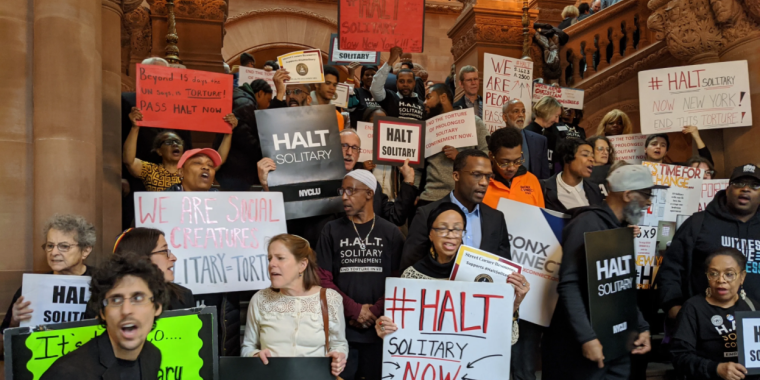
Senate Majority Passes the ‘HALT’ Solitary Confinement Act; Sanders Co-Sponsors
March 18, 2021

Today, the Senate Democratic Majority passed the Humane Alternatives to Long-Term Solitary Confinement Act (HALT), a bill Senator Sanders has supported and co-sponsored for many years. It was truly a triumphant day.
The legislation (S.2836) introduced by Senator Julia Salazar, limits the use of segregated confinement for all incarcerated persons to 15 days, implements alternative rehabilitative measures, including the creation of Residential Rehabilitation Units (RRU), expands the definition of segregated confinement, and eliminates the use of segregated confinement for vulnerable incarcerated populations.
“Long-term solitary confinement amounts to cruel and unusual punishment and has been shown to cause physical, emotional and psychological damage," Sanders said. "Moreover it fails to address and treat the underlying cause of an offender’s behavior. We need to rehabilitate inmates so that they can become productive members of society and are less likely to commit future crimes. There can be no benefit to locking someone away in a cell for 22 to 24 hours a day without any meaningful human contact or therapy. I am proud to join my colleagues in supporting the HALT Solitary Confinement Act, which will implement restrictions on who can be confined and for how long and will create more humane and effective alternatives to such confinement.”
Additionally, this bill establishes guidelines for humane conditions in segregated confinement, outlines reporting requirements, and adds due process protections by prohibiting placement in segregated confinement prior to a disciplinary hearing and by allowing access to counsel. The Nelson Mandela Rules, adopted by the United Nations, define segregated confinement for more than 15 days as torture. HALT will bring New York in compliance with this international standard and save the State tens of millions of dollars over the next several years.
The Humane Alternatives to Long-Term Solitary Confinement Act (HALT), S.2836, will:
Limit the use of segregated confinement in state prisons and county jails and implement alternative rehabilitative measures, including the creation of Residential Rehabilitation Units (RRU).
Restrict the use of segregated confinement for all incarcerated persons for up to 15 days.
Expand the definition of segregated confinement to include any form of cell confinement where an individual is held for more than 17 hours a day.
Mandate additional out-of-cell time and rehabilitative programming for individuals diverted to rehabilitative units after the 15-day limit has been reached.
Prohibit segregated confinement for special populations for any period of time.
Special populations are:
Individuals age 21 or younger,
Individuals age 55 and over,
Individuals with a disability,
And individuals who are pregnant, up to eight weeks postpartum, or caring for children in a facility.
Prohibit the denial of services, treatment, or basic needs such as clothing, food, and bedding while an individual is held in segregated confinement.
Mandate that staff must undergo 37 hours and 30 minutes initial training prior to assignment on segregated confinement units and 21 additional hours, annually, after assignment.
Add due process protections by prohibiting placement in segregated confinement prior to a disciplinary hearing and by allowing access to counsel.
Require DOCCS to publish monthly reports on its website with semi-annual and annual cumulative reports of the total number of people in segregated confinement.



